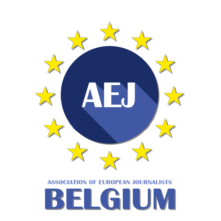
Press release: Brussels, 17 November 2025
Threats to media independence (including the rise of disinformation and political pressure), the safety and security of journalists, the disruptive impact of technology and AI, plus the importance of collaboration were major discussion points during the conference of the Association of European Journalists (AEJ) at the European Parliament’s Info Hub on 14 November. The event kick-started a weekend of activities, including the AEJ’s General Assembly and a range of cultural events.
The event, which brought together journalists from across the EU, was dynamically moderated by Rogier Elshout. In opening remarks, Arber Hitaj, AEJ International president (Albanian section), referred to surveillance, content manipulation and censorship as among the problems raised by the Freedom on the Net 2025 report, produced by the US think tank Freedom House.
“We are facing new forms of polarisation, disinformation and pressure on journalistic independence,” said AEJ Belgium president Elena Sánchez Nicolás. Whilst acknowledging the recent adoption of the European Media Freedom Act and the Anti-SLAPP (Strategic Lawsuits Against Public Participation) Directive [SLAPPs are being used to intimidate journalists] as “important steps” in ensuring media independence across Europe, she added: “But, as we all know, legislation is only one part of the story and the real work lies with us. It’s how we practise journalism every day and how we maintain the public trust in media in an era of rapid technological and social change”.
In a keynote speech, Teresa Anjinjo explained how, as European Ombudswoman, she is working on issues such as improving journalists’ access to documents, fundamental rights, the transparency of tobacco lobbying and the EU lawmaking process (a crucial area for citizens’ trust and engagement) plus an own initiative investigation on how EU agencies manage ‘revolving doors’, when officials move from public office to private sector roles.
The European Parliament’s head of press, Neil Corlett pointed out that the Parliament has frequently reiterated its concern and support for journalists and media freedom, including establishing a prize for investigative journalism, named after the murdered Maltese journalist, Daphne Caruana Galizia.
Pan-European collaboration was key as investigative media outlet Follow The Money won this year’s prize for an investigation into the Russian shadow fleet, which is being used to evade sanctions. The investigation was a cross-border collaboration with 13 other news outlets around Europe and more than 40 journalists, even beyond Europe. “One of the most important things is that people are aware of this now. Governments are aware of this now and they can’t say: ‘we didn’t know’,” said Birte Schohaus, Follow The Money’s deputy editor-in-chief.
Collaboration among young journalists is in full swing via the Sphera Network, which has received seed financial support from the European Commission. “This year […] we started a new collaboration with some media outside the network [from Ukraine, Estonia and Lithuania] to see together if we are able to create […] a mutual shared infrastructure that can unite all the small and medium sized independent media across Europe,” said co-founder Francesca Festa.
Renate Schroeder, director of the European Federation of Journalists, which represents over 296,000 journalists in 74 journalists’ organisations across 44 countries, lamented the fact that the mastermind behind the murder of Daphne Caruana Galizia is still not behind bars. She also said that journalists are frustrated by the ‘impunity culture’, e.g. in Serbia currently, “where journalists are being bashed on all levels and the police is just watching […]”.
Commenting on AI, she said that journalists have to adapt to the changing world, with the EFJ holding a workshop in Copenhagen recently about how to best use AI tools.
The head of the European Parliament Info Hub, Piotr Bartoszewicz-Malicki, said: “I believe your role [as journalists] is also more and more important because of the global landscape. We have this definite promotion of authoritarian and top-down approach to governance being promoted all around the world. And I think it’s the duty of Europe to show that the model of individual freedoms, participatory democracy and parliamentary democracy is valid and that it can deliver.”
The event was rounded off with a talk by National Geographic explorer, photographer and writer Justin Jin, who showed stunning photos of the Arctic that he took while exploring energy and geopolitics issues. Against a global context in which AI-generated deepfake images are becoming more prevalent, he stressed how he makes it a condition of his work that every photo is real and unmanipulated.
Click here to read the full report
The full line-up:
Speakers:
Arber Hitaj, AEJ International President, (Albanian Section)
Elena Sánchez Nicolás, AEJ Belgium President and Editor in chief at EUobserver
Neil Corlett, Head of Press, European Parliament
Piotr Bartoszewicz-Malicki, Head of the European Parliament Info Hub
Teresa Anjinho, The European Ombudsman
Panel on the state of journalism in Europe speakers:
Renate Schroeder, Director, European Federation of Journalists
Birte Schohaus, Deputy Editor-in-Chief, Follow the Money – Daphne Caruana Galizia Prize for Journalism Winner
Francesca Festa, Co-Founder of the Sphera Network and Associate Director of Development at Médianes
Talk:
Justin Jin. How to Create Pictures Worth a Thousand Words: Lessons from a National Geographic Photographer.
Moderator:
Rogier Elshout, moderator, presenter and host of debates, conferences, events and talkshows
